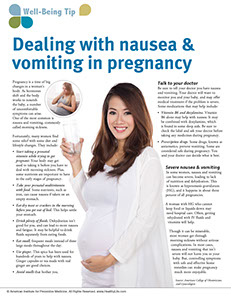SYMPTOM CHECKER
CONDITIONS
Male
Female
Child
Arm, Hand & Shoulder Concerns
Legs & Feet Concerns
Dental & Mouth Concerns
Ear & Nose
Eye Conditions
Head Conditions
Arm, Hand & Shoulder Concerns
Legs & Feet Concerns
Front
Back
Arm, Hand & Shoulder Concerns
Dental & Mouth Concerns
Ear & Nose
Eye Conditions
Head Conditions
Arm, Hand & Shoulder Concerns
Dental & Mouth Concerns
Ear & Nose
Eye Conditions
Head Conditions
Front
Back
Arm, Hand & Shoulder Concerns
Neck Links
Head & Neck Concerns
Arm, Hand & Shoulder Concerns
Neck Links
Head & Neck Concerns
Front
Back
Online Clinic
Wise Healthcare
Dealing with nausea & vomiting in pregnancy
Print on Demand
Pregnancy is a time of big changes in a woman’s body. As hormones shift and the body works to nourish the baby, a number of uncomfortable symptoms can arise. One of the most common is nausea and vomiting, commonly called morning sickness.
Fortunately, many women find some relief with some diet and lifestyle changes. They include:
• Start taking a prenatal vitamin while trying to get pregnant. Your body may get used to taking it before you have to deal with morning sickness. Plus, some nutrients are important to have in the early stages of pregnancy.
• Take your prenatal multivitamin with food. Some nutrients, such as iron, can cause nausea if taken on an empty stomach.
• Eat dry toast or crackers in the morning before you get out of bed. This helps settle your stomach.
• Drink plenty of fluids. Dehydration isn’t good for you, and can lead to more nausea and fatigue. It may be helpful to drink fluids separately from eating foods.
• Eat small, frequent meals instead of three large meals throughout the day.
• Use ginger. This spice has been used for hundreds of years to help with nausea. Ginger capsules or tea made with real ginger are good choices.
• Avoid smells that bother you.
Talk to your doctor
Be sure to tell your doctor you have nausea and vomiting. Your doctor will want to monitor you and your baby, and may offer medical treatment if the problem is severe. Some medications that may help include:
• Vitamin B6 and doxylamine. Vitamin B6 alone may help with nausea. It may be combined with doxylamine, which is found in some sleep aids. Be sure to check the label and ask your doctor before taking any medicines during pregnancy.
• Prescription drugs. Some drugs, known as antiemetics, prevent vomiting. Some are considered safe during pregnancy. You and your doctor can decide what is best.
Severe nausea & vomiting
In some women, nausea and vomiting can become severe, leading to lack of nutrition and dehydration. This is known as hyperemesis gravidarum (HG), and it happens in about three percent of all pregnancies.
A woman with HG who cannot keep food or liquids down may need hospital care. Often, getting rehydrated with IV fluids and vitamins will help.
Though it can be miserable, most women get through morning sickness without serious complications. In most cases, nausea and vomiting that isn’t severe will not harm you or your baby. But, controlling symptoms with safe and effective home remedies can make pregnancy much more enjoyable.
Source: American College of Obstetricians and Gynecologists
This website is not meant to substitute for expert medical advice or treatment. Follow your doctor’s or health care provider’s advice if it differs from what is given in this guide.
The American Institute for Preventive Medicine (AIPM) is not responsible for the availability or content of external sites, nor does AIPM endorse them. Also, it is the responsibility of the user to examine the copyright and licensing restrictions of external pages and to secure all necessary permission.
The content on this website is proprietary. You may not modify, copy, reproduce, republish, upload, post, transmit, or distribute, in any manner, the material on the website without the written permission of AIPM.
2021 © American Institute for Preventive Medicine - All Rights Reserved. Disclaimer | www.HealthyLife.com
















































